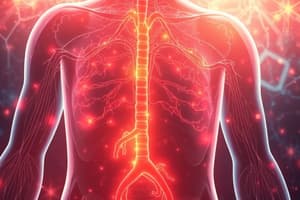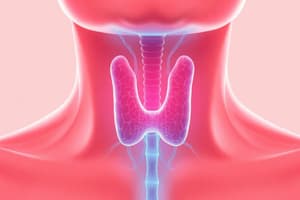Podcast
Questions and Answers
Which gland is under direct neural control from the hypothalamus?
Which gland is under direct neural control from the hypothalamus?
- Anterior Pituitary gland (correct)
- Mammary gland
- Thyroid gland
- Adrenal gland
Which hormone(s) inhibit(s) the secretion of corticotropin releasing hormone (CRH) from the hypothalamus?
Which hormone(s) inhibit(s) the secretion of corticotropin releasing hormone (CRH) from the hypothalamus?
- Antidiuretic hormone (vasopressin)
- Glucocorticoids (cortisol & corticosterone) (correct)
- Follicle-stimulating hormone (FSH)
- Adrenocorticotropic hormone
How does the hypothalamus regulate the anterior pituitary gland?
How does the hypothalamus regulate the anterior pituitary gland?
- Neurosecretion from axon terminals originating in hypothalamus
- Direct neural control
- Hypothalamic releasing hormones (RH) (correct)
- Paracrine communication
How does the hypothalamus regulate the posterior pituitary gland?
How does the hypothalamus regulate the posterior pituitary gland?
How do triodothyronine (T3) and thyroxine (T4) regulate their own secretion?
How do triodothyronine (T3) and thyroxine (T4) regulate their own secretion?
Which pancreatic hormone would you expect to be released after eating a bar of chocolate?
Which pancreatic hormone would you expect to be released after eating a bar of chocolate?
Which hormone level would you expect to be elevated during a period of fasting between meals?
Which hormone level would you expect to be elevated during a period of fasting between meals?
Which hormone level would you expect to be elevated during prolonged starvation?
Which hormone level would you expect to be elevated during prolonged starvation?
What is the main target tissue for mineralocorticoids?
What is the main target tissue for mineralocorticoids?
Which of the following regulates the secretion of parathyroid hormone (PTH)?
Which of the following regulates the secretion of parathyroid hormone (PTH)?
Steroid hormones easily pass through the plasma membrane by simple diffusion because they:
Steroid hormones easily pass through the plasma membrane by simple diffusion because they:
Most commonly, hormone release is controlled by:
Most commonly, hormone release is controlled by:
Role of hormones:
Role of hormones:
The hypothalamus can inhibit the release of:
The hypothalamus can inhibit the release of:
Peptide hormones exert their effect via:
Peptide hormones exert their effect via:
The action of Angiotensin II is opposed by:
The action of Angiotensin II is opposed by:
Which of the following is NOT a part of the pituitary gland?
Which of the following is NOT a part of the pituitary gland?
Follicle stimulating hormone in males supports:
Follicle stimulating hormone in males supports:
A cell's hormonal sensitivities are determined by the:
A cell's hormonal sensitivities are determined by the:
What four cell populations make up the endocrine pancreas?
What four cell populations make up the endocrine pancreas?
Which of the following hormones is NOT produced by the pancreas?
Which of the following hormones is NOT produced by the pancreas?
What is the primary difference in the way the nervous system (NS) and endocrine system (ES) communicate with their target cells?
What is the primary difference in the way the nervous system (NS) and endocrine system (ES) communicate with their target cells?
Which gland is controlled by the sympathetic nervous system and the endocrine system?
Which gland is controlled by the sympathetic nervous system and the endocrine system?
Which structure is responsible for integrating the responses of the endocrine and nervous systems?
Which structure is responsible for integrating the responses of the endocrine and nervous systems?
Which of the following are INCORRECTLY paired?
Which of the following are INCORRECTLY paired?
Flashcards are hidden until you start studying
Study Notes
Endocrine System - Advanced Notes
- Hypothalamus-Pituitary Axis:
- The hypothalamus directly innervates the posterior pituitary, releasing hormones such as ADH and oxytocin.
- The hypothalamus indirectly regulates the anterior pituitary by releasing hypothalamic releasing hormones (RHs) and inhibiting hormones (IHs).
- These RHs and IHs regulate the anterior pituitary's hormone secretion, which in turn influences a wide range of bodily functions.
- Thyroid Hormone Regulation:
- T3 and T4 from the thyroid gland play a crucial role in regulating their own production through negative feedback mechanisms.
- T3 and T4 inhibit the secretion of both TRH from the hypothalamus and TSH from the anterior pituitary, effectively controlling their own levels.
- Pancreatic Hormones and Metabolism:
- Insulin is the main hormone released after eating, facilitating glucose uptake and lowering blood glucose levels.
- Glucagon has an opposing effect, increasing blood glucose by stimulating glycogenolysis, gluconeogenesis, and lipolysis, primarily during fasting or prolonged starvation.
- Glucocorticoids (cortisol) also contribute to gluconeogenesis and lipolysis during prolonged starvation.
- Mineralocorticoid Action:
- Mineralocorticoids, primarily aldosterone, target the kidneys.
- Aldosterone regulates electrolyte balance by promoting sodium reabsorption and potassium excretion.
- Parathyroid Hormone (PTH):
- PTH is the main regulator of calcium levels in the blood.
- Its secretion is stimulated by low calcium levels, promoting calcium reabsorption from the bones and kidneys, as well as calcium absorption from the gut.
- Hormone Mechanisms:
- Steroid hormones, being lipid-soluble, can easily pass through cell membranes due to their hydrophobic nature.
- Hormone release is typically governed by negative feedback mechanisms, maintaining a balanced level of hormones within the body.
- Hormonal Functions:
- Hormones play a crucial role in regulating metabolism, stimulating gamete production, controlling growth, and mediating many other physiological processes.
- Hypothalamus and Hormone Inhibition:
- The hypothalamus can inhibit the release of several hormones, including TSH, ACTH, FSH, and GH, ensuring a balanced endocrine system.
- Peptide Hormones:
- Most peptide hormones exert their effects by binding to membrane receptors on target cells, triggering intracellular signaling cascades.
- Angiotensin II Action:
- Angiotensin II, a potent vasoconstrictor, is countered by natriuretic peptides like ANP and BNP, promoting vasodilation and lowering blood pressure.
- Pituitary Gland:
- The pituitary gland comprises two lobes: the anterior lobe (adenohypophysis) and the posterior lobe (neurohypophysis).
- The anterior lobe produces various hormones, while the posterior lobe stores and releases hormones produced by the hypothalamus.
- FSH in Males:
- Follicle Stimulating Hormone (FSH) in males directly influences sperm maturation, contributing to healthy sperm production.
- Hormonal Sensitivities:
- A cell's response to a hormone is dictated by the presence of specific receptors that bind to the hormone, not just the hormone's structure or circulating levels.
- Endocrine Pancreas:
- The endocrine pancreas consists of four main cell types: alpha, beta, delta, and gamma cells.
- Alpha cells secrete glucagon, beta cells secrete insulin, delta cells secrete somatostatin, and gamma cells produce pancreatic polypeptide.
- Pancreatic Hormones:
- The pancreas secretes insulin, glucagon, somatostatin, and pancreatic polypeptide, playing essential roles in regulating blood glucose levels and other metabolic processes.
- Nervous System (NS) vs. Endocrine System (ES):
- The NS uses neurotransmitters for rapid, short-lived, and specific transmission, while the ES utilizes hormones for slower, longer-lasting, and widespread effects.
- Sympathetic-Endocrine Integration:
- The adrenal gland is under dual control: the sympathetic nervous system directly stimulates the adrenal medulla, while the endocrine system (via ACTH) influences the adrenal cortex.
- Hypothalamus as Integrator:
- The hypothalamus acts as the crucial bridge between the nervous and endocrine systems, integrating their responses to maintain overall homeostasis.
- Endocrine Hormone Mispairing:
- Progesterone, a sex hormone, does not directly increase plasma glucose levels. While it influences glucose tolerance, it is not the primary hormone responsible for increasing blood glucose levels.
Studying That Suits You
Use AI to generate personalized quizzes and flashcards to suit your learning preferences.




